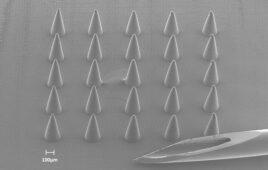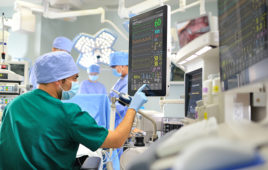An exciting new scientific frontier—synthetic biology—took center stage as a celebrated scientist from the Massachusetts Institute of Technology (MIT) recently spoke at the headquarters of the Office of Naval Research (ONR).
As part of a Distinguished Lecture Series celebrating ONR’s 70th anniversary, world-class scientists, researchers and experts from diverse fields will be speaking at ONR in 2016. Dr. Christopher Voigt, an MIT professor of biological engineering, inaugurated the lecture series with a look at the revolutionary potential of synthetic biology.
Synthetic biology involves creating or re-engineering microbes or other organisms to perform specific tasks like monitoring chemical threats, creating biofuels and even improving the health and physical performance of warfighters. The field was identified by Chief of Naval Research Rear Adm. Mat Winter as a top priority because of its far-ranging and broad-based impact on warfighter performance and fleet capabilities.
“ONR first realized the promise of this field over a decade ago to provide future naval forces with new, innovative approaches for threat detection, environmental sensing and enhancement of warfighter health and performance,” said Winter. “This platform could define the 21st century—impacting health, the environment and military capabilities.”
An ONR-supported performer since 2006, Voigt used concepts and techniques from electrical engineering to manipulate and program a cell’s circuitry. With these tools, scientists can engineer bacteria like Escherichia coli to carry out functions such as detecting specific light wavelengths or toxic chemicals.
“Dr. Voigt was among the first to say electrical engineering principles could be useful in synthetic biology,” said Dr. Linda Chrisey, a program officer in ONR’s Warfighter Performance Department. “The programming language he helped develop allows you to program a cell’s circuitry much like you would a computer or robot.”
That partnership paid off for ONR, which has since worked with university researchers like Voigt to unearth ways to use the smallest units of life to help Sailors and Marines execute their mission. Research areas include:
—Gut microbiology: This area focuses on how gut microbes respond to stressors common to warfighters—changes in diet, fearful situations, sleep loss or disrupted circadian rhythms from living in submarines. Rice University professor Dr. Jeff Tabor was featured in a recent Scientific American article for his ONR-sponsored work in the field.
—Threat detection: This involves designing highly sensitive microbes (which could be placed on a silicon chip and attached to unmanned vehicles) that could potentially sense the presence of pollutants, toxic chemicals or explosives like trinitrotoluene (TNT). Recent successes include creating a “smart” plant that turns white when it detects TNT.
—Biofuels: Specially engineered microbes with carbon dioxide-based metabolisms can use electrical currents to produce butanol, an alternative fuel. This same process might be able to make certain types of medicines or foods in remote locations.
“Right now, the research into synthetic biology is very basic and still in its early stages,” said Chrisey. “However, the future implications could be huge. Using cells to sense and process information would allow the Navy to reduce the size and weight of its current systems and make them more energy efficient.
“We also hope to use synthetic biology to enhance warfighter performance,” she continued, “by reducing susceptibility to stressors such as jet lag, noise and changes in altitude and temperature—by using the microbes that are naturally inside all of us.”




